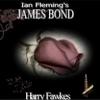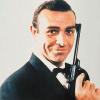Charm the Devil
By Harry Fawkes –
Full review 28/8/2011.Charm the Devil is a novella of much great reward. It really deserves a discussion page of its own, and I’d be happy to set one up and post this as the first entry, if the author is willing.
Harry Fawkes, always known for his sprightly and often gut wrenching action stories, has in the past occasionally added insight and reflection to the brawn of his tales. Here he has encapsulated with some clarity the thoughts and feelings of his characters who are all caught up in the web of deceit known as ‘espionage’, a world where, according to Bond,
“the lies never end.” The story is remarkably slight. It is 1950 and a young James Bond, still on the bottom rung of his Double-O career, is sent to Paris to aid the escape of Nightingale, a double agent operating in the heart of the Soviet administration. Nightingale turns out to be the fetching auburn haired Yelena Rostov but, unknown to her or Bond or her superior Ilya Klebanov, she has been unmasked.
Incidentally and somewhat annoyingly Yelena should be a ‘Rostova’. I write this as a point of order. Mr Fawkes has been quite meticulous with his preparation and research, but occasionally there are slips which surprised me: the President’s name should be Truman, the Soviet officials rarely use the favoured address ‘Comrade’, Klebanov wears a Rolex watch, World War 2 would be referred to by the Soviets as the Great Patriotic War, Jacques is misspelt (no ‘C’), Bond uses the word ‘suss’ which seems way too modern.
Now while these editing slip-ups don’t affect the overall impact of a very fine piece of writing – and I can almost forgive the Rolex reference as Klebanov is clearly something of a maverick Communist – they do irk. I’m not seeking full historical authenticity regarding the narrative of the story, but when the context has been so carefully measured, I would expect the detail to be accurate.
There is a similarly cavalier attitude towards punctuation. I witnessed the return of the dreaded
‘…’ as well as copious sentences set in italics or bold font, often for no apparent reason. This sign posting of words or phrases which the author believes to be significant is hard to understand. Does Mr Fawkes consider his literary merit so low that he needs to explain or emphasise anything important?
Surely not!
The good news here is that despite these grating flaws, the story which emerges is full of richly described characters inhabiting overcast and sullen cities and exhibiting all the nuances, all the doubt and all the fear of ordinary, real people. The writing seems to breathe the very era it represents, the Cold War years of the 1950s, when Soviet-ism was the new Fascism, Stalin and grey monotony were the new dictators to fear.
I loved the early sections of the novel, roaming through equally dull and oppressive cities: Moscow, where it pours
“wild driving ice cold rain”, London overwhelmed by smog resembling a
“thick malodorous gas” and a romantic Paris that unexoticaly
“smelled of coffee, onions and Gitanes.” Bond’s superior, M, is a slave to this era,
“a tall mark of honest principles”, quite prepared to order another man’s death as easily as he admonishes his errant agent for bringing the Service into disrepute. Killing is fine in his archaic world; scandal is not.
Indeed it is the low key descriptions of death which haunt the reader most. No blood and thunder here; the very simple flavourless extermination of Klebanov and his driver are callously beautiful, these are moments that pass through the day,
“an instant and cold kill at its most unpleasant,” as normal as writing a letter with Q-Branch’s own ‘poison pen’. I was reminded of the intercutting of assassination and baptism at the end of
The Godfather, the existence of evil next to good, of the fantastic beside the mundane. This is bravura storytelling and had me gripped; it’s instant, vicious, absolute and then with no looking back, life moves on.
Later, alone in their safe haven, a private train compartment bound for Calais, there is a similar naked subtlety between Yelena and Bond. As their relationship deepens, she touches him
“as a blind man touches the face to form a picture of the person… it was as if she was feeling his very being.” This is a fine analogical metaphor and we don’t need anything more substantial to explain their closeness.
Mr Fawkes is equally erudite when the story reaches its climax. Those expecting a finale akin to
Midas Gold will be whole heartedly disappointed. There are no overblown histrionics this time. Instead we are taken back to Ian Fleming’s writings as the author imperils Bond and Yelena expecting
“death’s icy eye” to inflict her damage. Earlier, Bond admitted his plan was flawed, that it would require
“luck and chance” to succeed. He is right and the ensuing bloodbath is swift, sudden and sensationally understated.
It’s as if Mr Fawkes has decided to perform in classic monochrome rather than Technicolor:
“It had all happened in a flash and now there was only a deathly silence, just the train speeding onwards and four bodies littering the carriage floor.” The sheer unfussiness of the narrative strikes us hard and fast.
“[Bond] felt a red hot spike punch him through the chest” is about as florid as we get and the passage works brilliantly because of it.
That the story is not fully resolved – much like Fleming’s own train-bound escapade
From Russia With Love – only heightens the drama. The final sentences conjure the thoughts of the dying, dragged back to distant, indistinct memories and wishes. Again, the lack of flamboyance exerts a pull on the reader. This isn’t easily done. It takes great skill to pare down a narrative and great confidence to leave a tale at the point of greatest tension.
I’d go so far as to say that for impact, this conjures echoes of Fleming’s final lines to
You Only Live Twice and leaves the reader as uncertain about Bond’s future as the character himself. The author left us in a similar realm at the end of
Trouble Shooter, but this is more poignant. The almost wistful nature to Bond’s thoughts reminds us he does have a soul, he does yearn for a life beyond the world of spies. That of course, is what Bond unconsciously offers Yelena. My only bug here is that Bond uses the term
“a promise is a promise” to describe his personal pact, when he never promised but only gave
“his word.”At the point of disaster, Bond of course recognises his folly.
“Serves him right for being an arrogant, self-centred snob who thinks he knows it all” he muses, lying injured among corpses. This neatly reflects back to his afternoon of passion with Corrine, when her observation that
“you made love to me as if it was the last time” makes him ponder his secret world:
“…a life that was filled with violence, a cold and sometimes shameless life that was topped up with mound upon mound of cruel deception. It was the life of the spy, he thought, and one simple mistake could cost him everything.”Both Corrine and Yelena have, in different ways, fleetingly touched his soul, a
“wretched death-watch beetle of regret and doubt,” and it has unprepared him for the confrontation ahead. While clearly an expert in his trade, Bond is unable to cope with the emotional side of life. Sex is a substitute for love, hedonism exchanged for security. He’s more interested in food, drink and cars than forming any lasting relationships. Even Bond’s one-armed accomplice Jacques Saint Cheval remarks that he has
“the organised and healthy mind of a Double O agent with a licence to kill” and not, by implication, the mind of a normal everyday person, capable of feelings and friendship.
In fact there is only one relationship compatible to Bond in
Charm the Devil and that’s with his blessed
“undertaker’s tool”, the Beretta .25,
“a sleek, sexy piece of metal.” Bond has a sensual relationship with the handgun,
“index finger stroking the thin piece of metal that was the trigger… every time he somehow felt complete.” It is telling he refers to it in the feminine gender when describing the ease of a kill:
“one squeeze and a blink of the bitch’s eye meant his target was a dead-goner.”The Beretta is almost a character on its own. Of the other supporting roles, each is fleshed out superbly, from Klebanov’s corrupt colonel to Yelena’s disillusioned intern, Cheval’s sage-like mentor to Corrine’s wise woman of the night; they are characters with meat on their bones, each displaying elements of slight melancholy, that pensive sombre emotion which underpins the whole dark tale. There are no rainbows for anyone in Mr Fawkes’ 1950, just bitter air, cold passion, cigarette smoke and the unrelenting foreboding of death.
There is much of interest and elegance on display here. I’d rank
Charm the Devil very highly indeed. If Roger Mulvaney MRQ a.k.a. Harry Fawkes ever wants to forsake the military, he could certainly do no worse than forge a career as a novelist. It’s a tough nut to crack (I know, I’m trying) but even given a need for minor refinement, the potential for truly great things is very evident in this opus.
Chris
Edited by chrisno1, 29 August 2011 - 09:48 AM.









